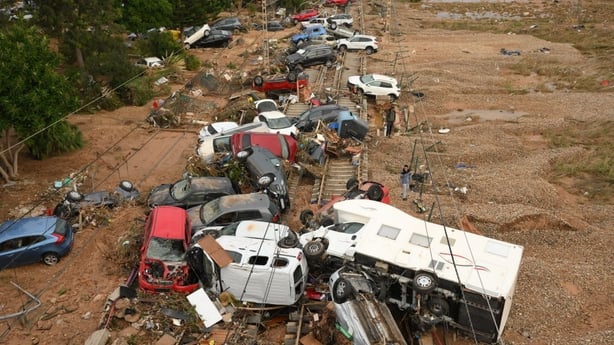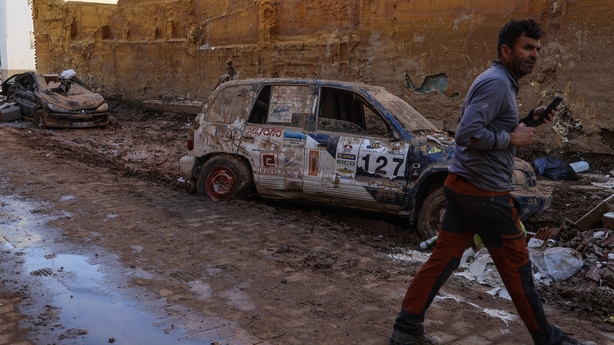Spain's leftist government has approved a "paid climate leave" of up to four days for workers to avoid travelling during weather emergencies, a month after floods killed 230 people.
Several companies came under fire after the 29 October catastrophe for ordering employees to keep working despite a red alert issued by the national weather agency.
The firms said the authorities failed to inform them sufficiently and sent telephone alerts too late during the European country's deadliest floods in decades.
The new measure aims to "regulate in accordance with the climate emergency" so that "no worker must run risks", Labour Minister Yolanda Diaz told public broadcaster RTVE.
If emergency authorities raise the alarm about a risk, "the worker must refrain from going to work", said Ms Diaz.

Employees can resort to a reduced working day beyond the four-day period, a mechanism that already exists for emergencies, the government said.
Economy Minister Carlos Cuerpo warned the cost of extreme weather events could double by 2050 as the government confirmed €2.3 billion of fresh aid for flood victims.
Scientists say climate change driven by human activity is fuelling the increased length, frequency and ferocity of natural disasters.
Traumatised Spain marks one month since catastrophic floods
Meanwhile, angry residents called for fresh protests as the country marked one month since the floods.
Outrage swept the European nation after the catastrophe tossed cars, wrecked infrastructure and destroyed homes and businesses, particularly in the eastern Valencia region.
Telephone alerts reached some residents when water was already raging through towns, while several municipalities went for days without state help and relied on volunteers for food, water and cleaning equipment.
The authorities' handling of the disaster prompted trade unions and associations to call for rallies in the hardest-hit areas today.

Another protest is expected in Spain's third city Valencia tomorrow. A first demonstration on 9 November drew 130,000 furious citizens demanding the resignation of regional leader Carlos Mazon.
"What is demanded of us is that we are efficient and arrive as soon as possible... that is the people's main complaint," Mr Mazon told reporters today.
"We have to be extraordinarily understanding with the protests... there are still lots of people who have received nothing, so we cannot rest," he added, announcing the reopening of Valencia's metro on 3 December.
Popular outrage boiled over in the ground-zero town of Paiporta on 3 November when survivors hurled mud at King Felipe VI, Queen Letizia, Prime Minister Pedro Sanchez and Mr Mazon.
Mr Sanchez and Mr Mazon were escorted away and their fleeting unity has since collapsed, with the left-wing central government and the conservative regional administration trading blame for the handling of the floods.
Elsewhere, thousands of troops, police, firefighters and volunteers continue to clear debris, repair damage and extract mud from garages, basements and car parks in the traumatised Valencia region.
Two piles of rusting vehicles greet visitors to the town of Catarroja, where garages are still caked with mud and the council declared three days of mourning for the victims.
"They have supported us a lot, but one month on many of the streets are a mess, the parks are still destroyed," said 44-year-old Gyovana Gimenez, whose restaurant was gutted by floodwater.


